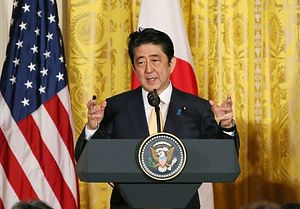Japanese Prime Minister Shinzo Abe’s approval rating fell to 26.7 percent in a new poll conducted by Nippon TV and released on Sunday.
The figure marks the lowest ebb in Abe’s approval since he became prime minister for a second non-consecutive term in December 2012 amid widespread scrutiny over his role in an ongoing scandal.
Another poll released on Sunday, conducted by the Asahi Shimbun, showed Abe’s approval at 31 percent with more than half of all respondents expressing disapproval toward his leadership. Meanwhile, a survey released by Kyodo showed a higher approval for Abe, at 37 percent.
Since leading the Liberal Democratic Party (LDP) to victory in the October 2017 snap election, Abe’s administration has found itself besieged by a scandal concerning a Japanese private school operator, Moritomo Gakuen, and its links to Abe and his wife, Akie.
The scandal intensified in March 2018 after a senior official in the Japanese Ministry of Finance admitted that falsified documents had been presented to the Japanese Diet as it examined the scandal, with Abe and his wife’s names excluded.
Abe’s flagging approval ratings leave his political future under question with the LDP’s next leadership election expected in September 2018.
Abe has led the party for two terms and is eligible to run for a third term after an internal party rule change in 2017 abolished a previous two-term limit. Victory in the LDP leadership elections this fall would significantly increase the odds of Abe becoming the longest-serving postwar prime minister in Japan.
His ongoing term has made him the third longest serving post-war prime minister; Shigeru Yoshida, Japan’s first postwar prime minister, and Eisaku Sato both held the post for longer.
Heading into the leadership election, Abe faces multiple challengers, including Shigeru Ishiba, a former minister of defense, and Shinjiro Koizumi, the first vice secretary-general of the LDP and a son of former Prime Minister Junichiro Koizumi.
Abe’s domestic political troubles come at a sensitive time for Japan given ongoing diplomacy surrounding the Korean Peninsula. Abe is scheduled to arrive in Washington this week for a summit at Mar-a-Lago with U.S. President Donald Trump.
Abe is currently over five years into a term as prime minister that began in December 2012. The LDP’s victory in the general elections that year put an end to three years of rule by the now-defunct Democratic Party of Japan.
Prior to that, Abe had also been prime minister for a one year term between 2006 and 2007. Abe’s current stint in office put an end to more than five years of short-lived Japanese prime ministers, who each spent around one year in office.

































